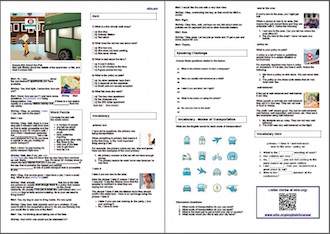About the Flat
Mari ask Shirley about the details of the apartment, or flat, and what it comes with.
Mari: Hi, I was here yesterday inquiring about the one bedroom apartments you have available.
Shirley: Yes, that right, I remember, how are you?
Mari: Good, how are you? I just have some questions, the primary one being transportation. Can you tell me about if there is a bus station nearby or a subway station nearby and how far it is from the city center.
Shirley: Okay, no problem. I take it you are new to the area?
Mari: I am.
Shirley: Okay. Well, there is a bus stop just 5 minute’s walk from here so that is really accessible and the subway is only 15 minute’s walk. I don’t think I mentioned yesterday but only one of the flats has a car park assigned to it so do you have a vehicle or are you looking for public transport?
Mari: I think I’m just looking for public transport right now.
Shirley: Well, also if you are new to the area you may not know that we also have ferry services as well. Being this close to the bay, it’s about 20 minutes down to where the ferry leaves from but if you are going to the other side of the bay that is probably the fastest and easiest way to get there so lots of public transport that is accessible to you.
Mari Goes to Australia
Part 1: Any Vacancies?
Part 2: About the Apartment
Part 3: Money Details
Part 4: Getting Connected
Part 5: Quiet Foo-foo!
Part 6: Dinner
Part 7: Leaving
Mari: Okay, that sounds good. I also have a pet, I have a small dog. What is your policy on pets?
Shirley: Well, actually a number of people that live in the flats are owners so usually even though there is a policy that renters can’t have an animal it depends pretty much on the owner residents. So usually if the pet is small and well-trained and well-behaved they’re fairly accommodating. So is your pet used to living inside?
Mari: Yes, my dog is used to living inside. It’s very quiet.
Shirley: Okay then, that probably won’t be a problem. I’ll just need to talk to the cooperative about it. So are you thinking that you would like to take one of the flats?
Mari: Yes, I’m thinking about taking one of the flats.
Shirley: And which one would you be interested in?
Mari: I would like the one with a very nice view.
Shirley: Okay, overlooking the bay, so that would be $900 a month.
Mari: Right.
Shirley: Okay then, well, perhaps we can talk about what our policies are for payment and some other financial matters.
Mari: Sure.
Shirley: Okay great. Let me just go inside and I’ll get a pen and some papers for you.
Mari: Thanks.
primary one

I have some questions, the primary one being transportation.
When something is primary, that means it is the first thing, or the most important thing among a set.
For example, the primary colors are red, blue and green. Here are few examples of the word primary:
- My primary concern is that we will not have enough money.
- The primary reason he went home was because he was tired.
I take it

I take it you are new to the area.
Here the phrase 'I take it' means 'I think' or 'I assume'. It lets the listener know that the speaker is confident in what they are saying but not sure.
The phrase 'I take it' lets the listener know they should confirm the statement. . Here is an exchange using the phrase 'I take it'.
- I take it you are not coming to the party. ( Are you coming?)
- No, I have to work.
new to the area

If you're new to the area, you might get lost.
When a person is new to an area, that means they just moved there and they are unfamiliar with it. Notice the following:
- I am new to the area. Can you tell me where the post office is?
- Are you new to the area? I have not seen you before.
policy on

What is your policy on pets?
A policy is a set of rules or guidelines people follow in a certain situation or environment.
For example, teachers may have a policy on homework. If it is late, you lose a point. Notice the following:
- We have a policy on sick leave. You can never take it!
- The policy on the dress code states that all men must wear ties.
well-behaved

If the pet is well-behaved and well-trained, it can stay.
When people or animals are well-behaved they act in a nice way. They are not rude or loud or messy.
The prefix 'well' means good. You can be well-behaved, well-trained, well-respected, well-known, etc. Here are a few examples using well-behaved:
- My students are so noisy. They are not very well-behaved.
- The child was very well-behaved on the flight.
Keep Listening
Here are some more great lessons!
Vocabulary Challenge
new to the area • policy on










